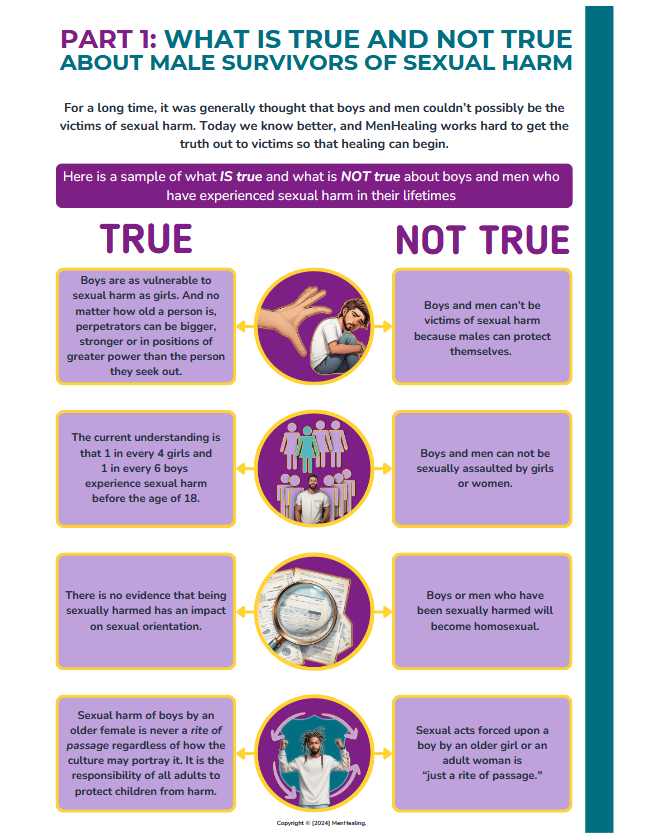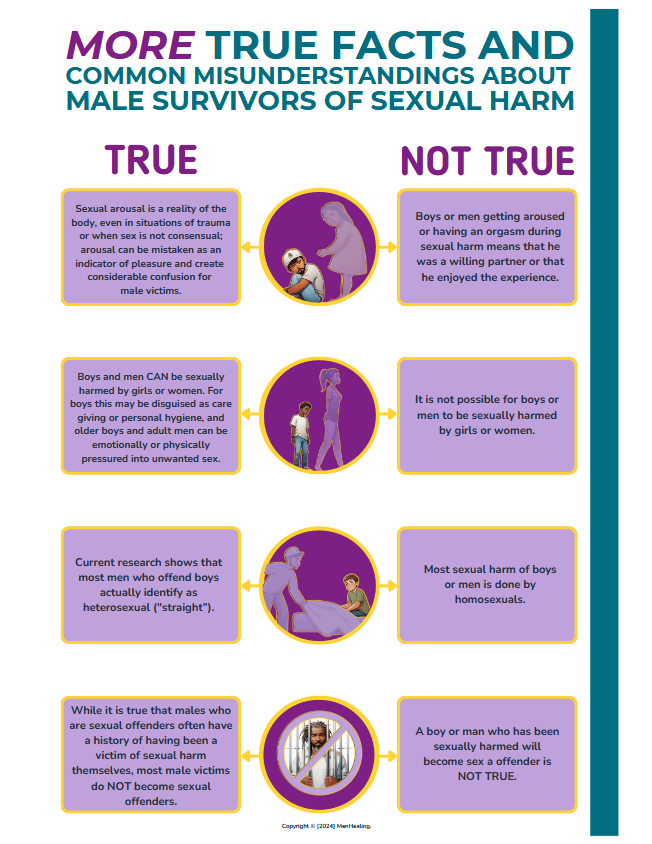Our services and programs are designed for all adult male survivors of sexual trauma; whatever their age at the time it happened.
Visitors will notice that we use “male sexual harm” instead of “male sexual assault” or “male sexual abuse.” We find that some people associate the word “assault” with adults and “abuse” with children, and that can sometimes interfere with survivors’ search for healing resources.
Learn More About the Language of Sexual Harm
This page addresses questions about male sexual harm in general. If you want to know more about all our support programs for men and their partners, please visit our home page.
Basic Truths and Untruths
There are many misconceptions about the sexual harm of men. In addition to the FAQ below, we have a guide that includes some basic truths and common misconceptions. Click the pages to download.


Male Sexual Victimization Questions
If you have a question that is not addressed here, please use our contact form and we’ll try to help.
How Do I Find A Trauma Therapist Near Me? How Do I Know If They Are Good?
Although the experience of trauma is nothing new, treatment of trauma IS relatively new. Fortunately degree programs are now including the identification and treatment of sexual harm and other forms of trauma.
As a potential client, you may inquire as to their background; including formal training and experience with sexual harm survivors. If a therapist isn’t willing to disclose their background then it is probably a good idea to choose another therapist.
Here are some links to sites that provide ways of finding a therapist:
I Don’t Have Any Money For Therapy. How Do I Get Help?
MenHealing conducts online Peer Support Groups for male survivors and their partners. Financial assistance is also available.
You may also find a mutual support group in your area. Some groups have online meetings so that people who don’t live nearby can get support.
Survivors Of Incest Anonymous is a Twelve Step-based program for adults who experienced childhood sexual harm. RAINN also a hot line connecting survivors with resources.
I Think I Know Someone Who Was Sexually Victimized. What Should I Do?
Unfortunately, sexual harm is so common that almost everyone knows someone who was sexually victimized.
Some people who have experienced sexual harm want to talk about it, but are afraid of not being believed, or being rejected. They may be relieved to have someone else start the conversation. Others might take an inquiry about sexual victimization as intrusive and react with denial, shame, or anger.
One way to start a conversation is to describe the behavior the person in question exhibits, but not label it as resulting from sexual harm. For example, saying, “I notice when there is a news story on sexual harm you mute the sound.” This is more easily heard as an invitation to talk about sexual harm in general, rather than asking the person if they have a history of trauma.
One way many males begin to talk is to use the, “I know a guy who,” technique, where they speak as if it had occurred to someone else. That way they can see how the listener reacts without being too vulnerable.
Here is a link that addresses the issues involved in talking with a loved one.
Should I confront my abuser?
Confronting your abuser is not a requirement for healing. Every person makes their own unique decisions about if, when and how to interact with their abuser.
The prospect of confronting one’s victimizer is complex, particularly if the victimization was perpetrated by a family member or a well-known person in the community. Unfortunately, it is common for people to side with the perpetrator against the victim.
Persons whose victimizer(s) are no longer living can symbolically confront using role plays or writing “letters”, sometimes to and “from”. One advantage of this is the victimized person is totally in control of the process. Survivors whose victimizer is still alive can also use this symbolic process, prior to, or instead of, directly confronting a victimizer.
What Can I Do If My Partner Doesn’t Understand What’s Going On With Me?
The open discussion of sexual victimization is actually a relatively recent phenomenon, particularly regarding the sexual victimization of boys and men. It is common for males to have never disclosed their experiences of victimization to anyone, including life partners, family members or other significant persons. Even those males who have met with therapists or other healing professionals may not have disclosed what happened, despite being asked directly if any victimization was part of their history.
It is important to be sensitive when disclosing a history of sexual victimization. Listeners can have all manner of reactions, some helpful, and some harmful. There are many men who disclosed their victimization to someone who reacted negatively, increasing the survivor’s sense of shame, and the survivor reacted by never again discussing it with anyone.
Telling Someone About What Happened
Talking About Sexual Assault (written for women but the concepts still apply).
How Can A Person Claim He Was A Victim When He Kept Spending Time With The Person?
One of the most common questions asked about the sexual harm of children is, “Why did he keep spending time with someone that abusing him?”
For one thing, children are dependent on adults to explain how the world works. Adults who sexually harm children purposely talk them into believing that sexual contact between children and adults is normal and acceptable. Children naturally seek the attention and approval of adults and, even in abusive situations, the child strives to please the adult.
There is also the fear of retaliation. The child may rightly fear that if he protests or discloses what is happening he will be punished. Often, the victimizer will threaten to hurt, even kill, the child’s loved ones if they tell anyone.
Sometimes the child keeps the abuse secret because they know the adult will face serious consequences, and they want to protect the adult. Sadly, in the lives of some boys, the person victimizing him is the most important adult in his life; the one that gives him the most attention and spends the most time with him.
Some boys realize that if the victimization becomes known they will lose the benefits that are part of the relationship such as money, travel, gifts, or alcohol and other drugs.
Here is a link to an article about the boys who defended Michael Jackson from allegations of abusing them.
What Is The Difference Between Guilt And Shame?
People who have been victimized are likely to experience both guilt and shame. For a long time many people thought of shame as merely an extreme level of guilt, but it has become clear that they are two different emotions. One source of guilt and shame for people who have been sexually harmed are the things done, or not done, during and after, the victimization took place. For example, enjoying the attention provided by the victimizer, or liking the sensations of touch.
Feeling guilty for what one did, or didn’t do, when being victimized is sometimes referred to as irrational guilt. Irrational or not, it still has an effect on one’s ability to enjoy life, and ought to be addressed.
There is also survivor’s guilt which is what a person experiences when he was able to avoid some aspect of a traumatic event but another person did suffer from it.
Here is a link to an article that describes the difference between guilt and shame.
I Feel Crazy. Am I Crazy?
Crazy is a word which sometimes means, “having big emotions.” It can also mean having symptoms of Post-Traumatic Stress Disorder* (PTSD).
Many people have heard the term but think it only applies to those who have experienced combat, a school shooting, or some dramatic natural disaster. But the experience of sexual assault can also result in PTSD.
While not every person who experiences a traumatic event will develop PTSD, the event can still have serious effects on the survivor’s mental health. Fortunately there are effective treatments for PTSD and other symptoms caused by trauma.
One such treatment is Eye Movement Desensitization and Reprocessing (EMDR).
Is It PTSD Or Is There A Better Term?
Some people object to the term Post-traumatic Stress Disorder because they believe the word disorder stigmatizes people; they believe a better word would be injury or condition. Here is a link to a debate about which words are most accurate and useful.
There is also a new term being used for victims of long-term victimization: Complex-PTSD. Visit the CPTSD Foundation for more information.
What Is Dissociation?
Dissociation may occur in people with PTSD, C-PTSD, or other trauma. For example, if you have trouble remembering certain periods in your life, you may be experiencing a type of dissociation called dissociative amnesia. Someone with dissociation might feel a sense of unreality and lose their connection to time, place, and identity.
Common responses to threats are fight, flight, or freeze. In many cases of sexual harm, particularly when the victim is a child, fighting would only make things worse.
A second defense to a threat is to flee, but when a child is dependent on an adult for shelter and food where is the child to flee? This is the situation when the victimization is within a family environment.
The third common response to a threat is to freeze. In some cases this means stopping all physical movement, the body going limp or getting rigid. The mind can also freeze, meaning not taking in what is happen, sometimes by focusing on some non-threatening detail. For example, concentrating on an object in the room rather than paying attention to what is happening to one’s body.
Here is a PDF file with a description of dissociation and some actions a person can take in response.
Why Do I Still Have Nightmares?
Nightmares are commonly experienced by those who have survived a traumatic event. Sometimes they become less frequent over time, but they can continue for years. They can be so disturbing that people are afraid to go to sleep, or they use alcohol or other drugs before bed to try to prevent the nightmares. However, lack of sleep and over use of drugs creates additional problems and doesn’t usually eliminate the nightmares. Sometimes the nightmares are a replaying of actual events, and other times they can be more symbolic. For example, having the theme of helplessness or being chased.
How Trauma Can Affect Your Dreams
Nightmares After Trauma
Why Don’t I Ever Feel Safe? Men Aren’t Supposed To Feel That Way.
Cultures around the world have differing expectations concerning what types of thought, behaviors, and emotions are considered acceptable for males. Many males are taught that fear is inappropriate. But fear is a natural response to threats.
A person who has been exposed to threatening situations (sexual harm, natural disasters, war) can develop hyper-vigilance, a condition in which he is constantly looking for danger. Not only is it emotionally exhausting, but often he will believe that neutral factors are actually menacing.
A useful method of coping with this is to identify one’s own triggers (the external factors that are reminders). For example, a time of day or year. A smell, sight or sound that was part of a past abusive experience.
In other words, identifying how the past and the present are SIMILAR. Then to identify what choices are possible now, that weren’t an option in the past. In other words, how the past and the present are DIFFERENT.
Here is a link that expands on these concepts.
Help for Male Survivors is Here
Our Retreats
Our Weekend of Recovery (WOR) retreats are three-day healing workshops for male survivors of sexual harm, sexual assault, or sexual trauma as a child or as an adult.
Learn More About Weekends of Recovery
Survivor Resources
We have compiled a searchable database of organizations that provide resources for survivors of sexual harm.

